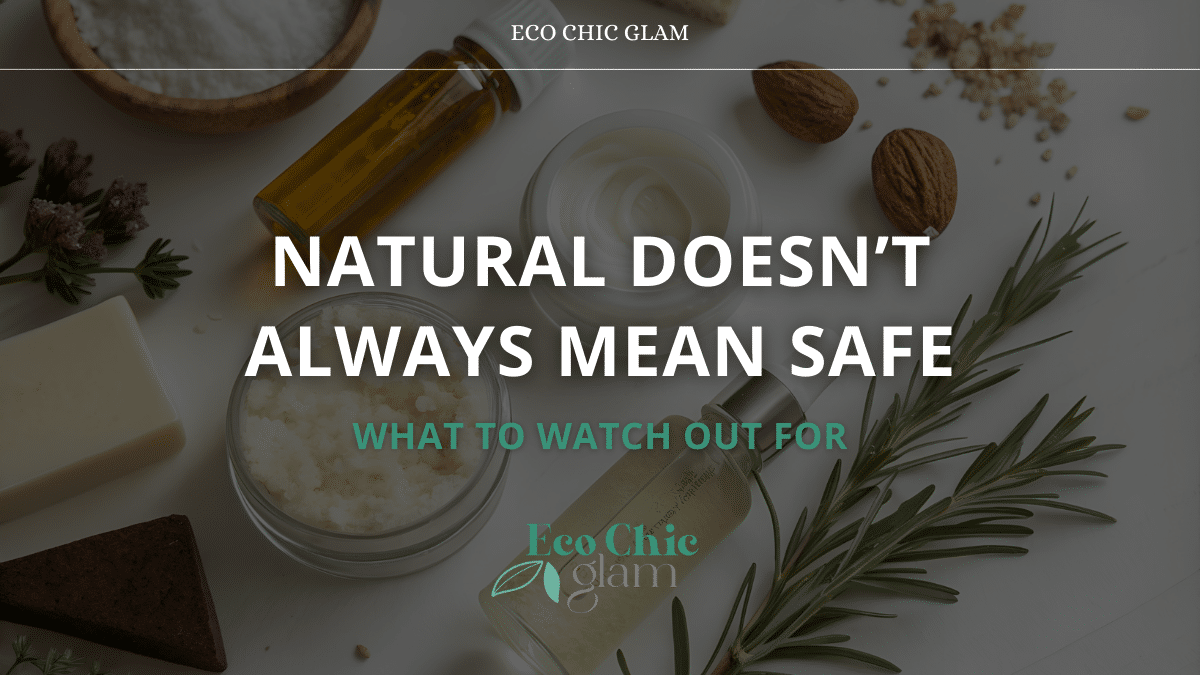“Natural” sounds safe. Comforting. Clean. But here’s the truth most brands won’t tell you:
Just because it’s natural doesn’t mean it’s good for your skin. 😬
From essential oils to plant extracts, nature can be powerful—but in skincare, that power isn’t always gentle. If you’re diving into clean beauty, it’s time to look deeper than the label.
🧴 What Does “Natural” Even Mean?
Unlike words like organic or cruelty-free, the term “natural” is not regulated in most countries.
That means any brand can slap “natural” on a label—even if the product includes harsh or harmful ingredients.
💡 Reminder: Poison ivy is natural. So is lead. Doesn’t mean you want them in your face serum. 🙃
🚫 Natural Ingredients That Can Harm Your Skin
Let’s bust some myths and highlight common “natural” ingredients you should think twice about:
1. Essential Oils (Tea Tree, Lavender, Citrus)
While they can be helpful in tiny amounts, they’re also known to:
- Irritate sensitive skin
- Cause allergic reactions
- Increase sun sensitivity (especially citrus oils)
Pro tip: Avoid products with essential oils high on the ingredient list, especially if you have reactive skin.
2. Raw Apple Cider Vinegar (ACV)
Yes, it’s antibacterial. But undiluted ACV is acidic enough to burn your skin or destroy your moisture barrier.
Safe use: Always dilute it 1:5 with water if you’re using it in DIY skincare.
3. Lemon Juice
Lemon is a popular DIY brightener—but it’s a recipe for irritation, sunburn, and long-term sensitivity.
Why? It has a low pH and contains compounds that react to UV light, causing chemical burns (aka phytophotodermatitis).
4. Baking Soda
This pantry staple is often promoted for DIY scrubs or masks.
But guess what? It has a high pH (~9), which throws off your skin’s natural acid balance, leaving it dry, irritated, and prone to breakouts.
5. Cinnamon & Clove
These spices are often used in lip plumpers or masks. But they’re highly irritating and can cause redness, swelling, or even chemical burns if misused.
💚 How to Shop Smart for Truly Safe, Natural Products
- ✅ Look for dermatologist-tested or sensitive skin-approved products
- ✅ Choose brands that disclose full ingredient lists
- ✅ Check for third-party certifications (Ecocert, COSMOS, EWG Verified)
- ✅ Always do a patch test when trying new natural products
- ✅ Remember: less is more
Natural skincare is amazing—when used wisely and safely.
🙋♀️ FAQs
Q1: Is all synthetic skincare bad?
Not at all! Some lab-created ingredients are cleaner, more stable, and safer than their “natural” alternatives. It’s about safety and science, not just source.
Q2: Can I use essential oils on my face?
Only if properly diluted (usually under 1%) and your skin isn’t sensitive. When in doubt, skip them—especially citrus or peppermint oils.
Q3: What’s better: natural or organic skincare?
Organic skincare is held to stricter standards and usually safer. But the real key is transparency and ingredient quality—not just buzzwords.
📲 The Bottom Line: Nature Is Powerful—Respect It
The clean beauty world is full of amazing ingredients—but even nature needs boundaries.
Safe skincare is smart skincare. And the most natural product in the world still needs to be tested, balanced, and gentle enough for real skin.
✨ Follow us on social media for more clean beauty myth-busting, DIY tips, and ingredient guides
🌱 Visit EcoChicGlam.com for tutorials, expert reviews, and skincare that’s kind to your face and the planet

